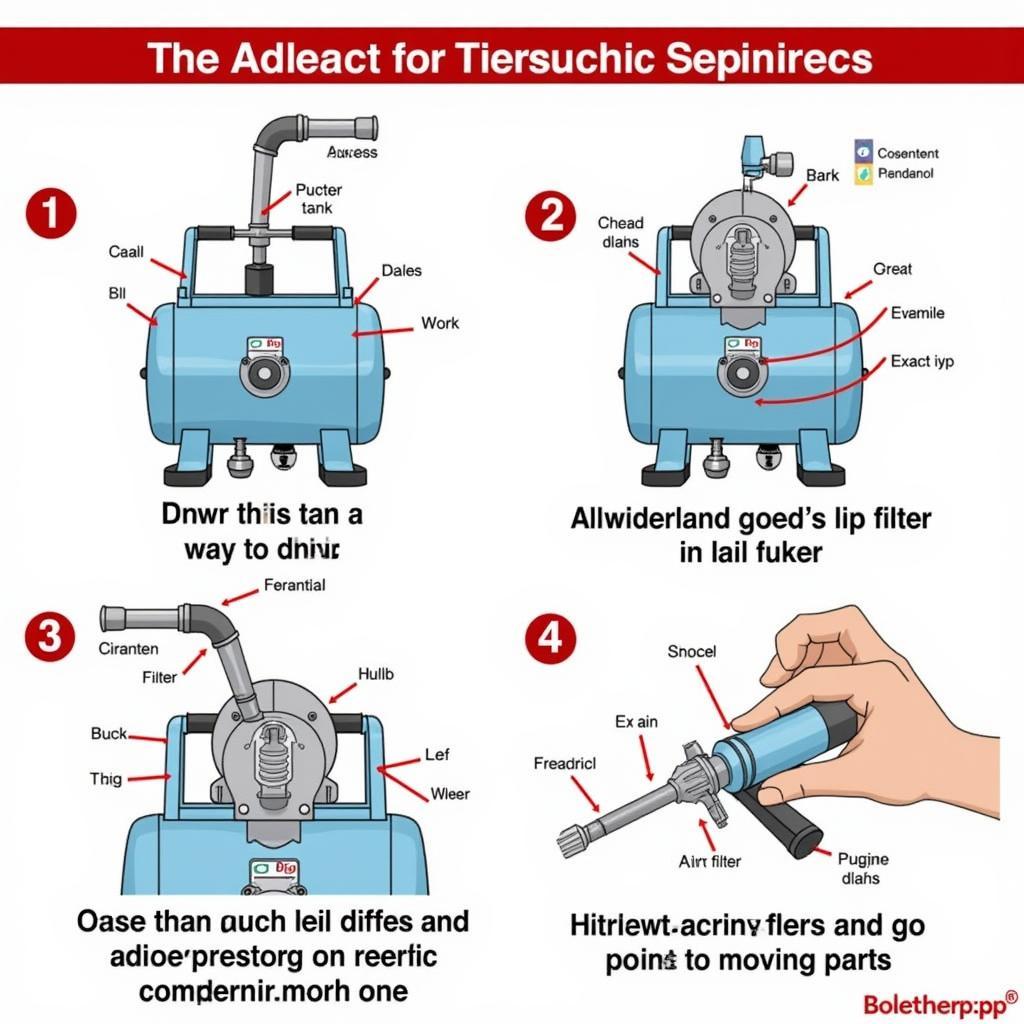The Iron Horse Air Compressor is a powerful tool, essential for a range of tasks, from powering pneumatic tools on a farm or ranch to inflating tires in a pinch. Understanding its capabilities, maintenance needs, and choosing the right model can significantly enhance your productivity and efficiency. Let’s dive into the world of iron horse air compressors and explore how they can benefit your work.
Understanding the Iron Horse Air Compressor
Iron horse air compressors are renowned for their robust construction and reliability. They are designed to handle demanding tasks, providing a consistent source of compressed air. Whether you’re a professional contractor or a DIY enthusiast, understanding the different types of iron horse air compressors can help you make an informed purchase.
Different Types of Iron Horse Air Compressors
Several types of iron horse air compressors are available, each tailored for specific applications. Portable compressors, often equipped with wheels and handles, offer convenient portability for jobs around the property. Stationary models, on the other hand, are designed for permanent installation in workshops or garages, providing a continuous air supply. Furthermore, single-stage compressors are ideal for lighter tasks, while two-stage compressors are built for more demanding applications requiring higher pressure and volume.
What are the benefits of an iron horse air compressor? These robust machines provide a reliable source of compressed air, powering a range of tools and equipment efficiently. Their durability ensures long-lasting performance, making them a valuable investment for any workspace.
Choosing the Right Iron Horse Air Compressor for Your Needs
Selecting the right iron horse air compressor depends on several factors, including the type of tasks you’ll be performing, the required air pressure (PSI) and airflow (CFM), and the available power source (electric or gas). compressor iron horse Consider the frequency of use and the desired portability as well. For instance, a smaller portable compressor might suffice for occasional tire inflation and nail gun use, while a larger stationary unit would be better suited for running heavy-duty air tools consistently.
Maintaining Your Iron Horse Air Compressor
Proper maintenance is crucial for ensuring the longevity and optimal performance of your iron horse air compressor. Regular checks and simple maintenance tasks can prevent costly repairs and extend the lifespan of your machine.  Maintaining Your Iron Horse Air Compressor
Maintaining Your Iron Horse Air Compressor
Essential Maintenance Tasks
Draining the air tank regularly prevents moisture buildup, which can lead to corrosion and reduce the compressor’s efficiency. Checking and replacing the air filter ensures clean air intake, protecting internal components from dust and debris. Lubricating moving parts minimizes friction and wear, extending the life of your compressor. compressor iron horse Finally, inspecting hoses and fittings for leaks prevents pressure loss and ensures safe operation.
How often should I drain my iron horse air compressor’s tank? It’s recommended to drain the tank after each use or at least once a week to prevent moisture buildup. This simple task can significantly extend the lifespan of your compressor.
Troubleshooting Common Issues with Iron Horse Air Compressors
Even with diligent maintenance, issues can occasionally arise with your iron horse air compressor. Understanding common problems and their solutions can save you time and money.
Identifying and Resolving Problems
Low air pressure can be caused by several factors, such as leaks in the air lines, a faulty pressure switch, or a clogged air filter. Excessive noise could indicate worn-out parts or loose connections. Overheating can be caused by overuse or inadequate ventilation. By addressing these issues promptly, you can prevent further damage and ensure your compressor remains in optimal working condition.
“Regular maintenance is the key to keeping your iron horse air compressor running smoothly for years to come,” says John Davis, a seasoned mechanic with over 20 years of experience working with compressed air systems. He adds, “A little preventative care goes a long way in preventing costly repairs and downtime.”
Conclusion
The iron horse air compressor is a valuable asset for any workshop, farm, or ranch. Choosing the right model, maintaining it regularly, and addressing any issues promptly will ensure it serves you reliably for years to come. By understanding its functionalities and following these guidelines, you can harness the full power of your iron horse air compressor and enhance your productivity. compressor iron horse
FAQ
- What type of oil should I use in my iron horse air compressor?
- How often should I change the air filter?
- What is the difference between a single-stage and two-stage compressor?
- How can I increase the air pressure of my compressor?
- What safety precautions should I take when using an air compressor?
- What are some common signs of a failing air compressor?
- Where can I find replacement parts for my iron horse air compressor?
“Investing in a high-quality iron horse air compressor is a smart decision for any serious DIYer or professional,” advises Sarah Miller, a renowned equipment specialist. “Its power and reliability make it a versatile tool for a wide range of applications.”
Need Help?
For assistance, please contact us at Phone Number: 0772127271, Email: [email protected] or visit our address: QGM2+WX2, Vị Trung, Vị Thuỷ, Hậu Giang, Việt Nam. We have a 24/7 customer support team.